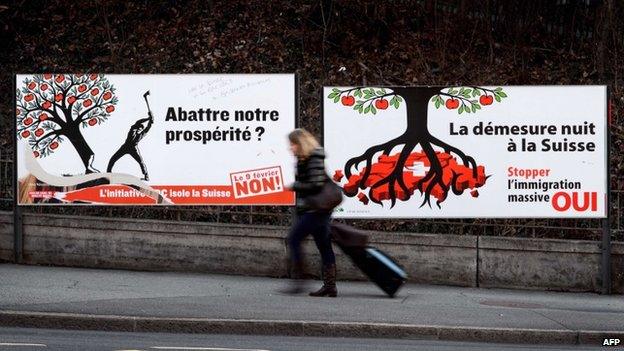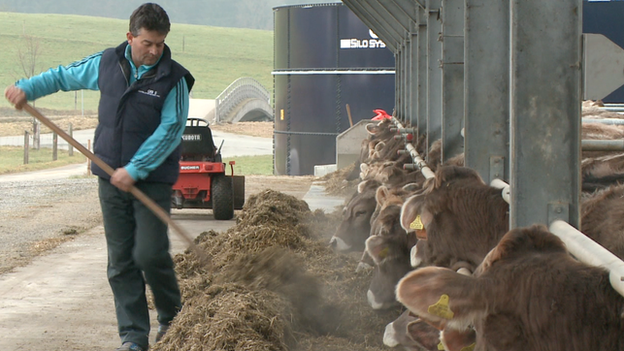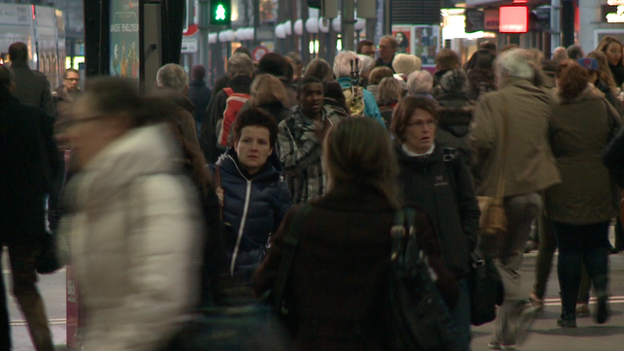Europe watches Swiss immigration vote
- Published

One poster suggests a Yes vote will hit prosperity while another says mass immigration is harming Switzerland
Swiss voters are going to the polls on Sunday in a nationwide referendum on immigration which is being watched closely right across Europe.
The proposal, external, from the right-wing Swiss People's Party, calls on Switzerland to abandon its free movement of people treaty with the European Union and introduce strict quotas on immigration.
Switzerland is not a member of the EU, but has adopted large sections of EU policy, including free movement and the Schengen open-borders agreement, in order to have access to Europe's single market.
Brussels has always insisted that the Swiss will not be allowed to cherry-pick only the aspects of EU policy they like.
But its successful economy, and soaring unemployment in many eurozone countries, make Switzerland a very attractive destination.
Too crowded
In 2013, 80,000 immigrants joined Switzerland's population of eight million. To put that in perspective, that would be the equivalent of more than 600,000 people entering the United Kingdom, or more than 800,000 arriving in Germany.
"It's getting too crowded," says farmer Martin Haab. "On the roads, on the trains, especially in the cities."
Mr Haab's farm is just outside Zurich, sandwiched between a busy railway line and an even busier motorway.
"I worry for my son," he explains, "and for my grandchildren. If we have 80,000 people a year… that means in 20 years, 10 million in Switzerland; in 40 years 12 or 13 million - that means the whole of north-west Switzerland will be one big city in the end."
But while Mr Haab has genuine fears about overcrowding, he is also a local politician with the Swiss People's Party, and shares its hostility to the European Union, and its determination to crack down on immigration.

Farmer Martin Haab is a member of the Swiss People's Party, which is behind the referendum
He would like Switzerland to return to its earlier policy of hiring foreign workers on a temporary or seasonal basis, requiring them to come to Switzerland alone and to return home as soon the specific job they came to do is finished.
"With free movement now, we know that only 50% of the immigrants work here," he explains. "The rest are just families."
But Mr Haab's view is not shared by many Swiss employers, who claim their success is actually because of, rather than despite, free movement.
Stephan Camenzind is director of one of Zurich's most successful architect firms, with orders including a contract to design Google's offices right across Europe.
Of his 20 employees, just a third are Swiss, the rest are from the European Union.
"We depend on a highly skilled workforce," he explains. "And that workforce we simply can't find in Switzerland, so we do depend on being able to look for talented staff in the European Union."
So what would happen if his freedom to do that was restricted by quotas?
"Well it's quite simple," he says. "We would have to shrink. We would lose our critical mass to compete globally, so basically there wouldn't be a business anymore."
That is a worrying thought for his German employee Claudia Berkefeld, who has worked in the UK as well as Switzerland, and relishes the opportunities offered by free movement of people.
"It concerns me in the sense that being able to move around freely and work in Europe [is important], I would find it very limiting if you couldn't do that."

Opinion polls suggest the result will be close
EU workers in Switzerland are not the only ones worrying about the consequences of a no vote to free movement of people. Swiss business leaders are anxious too.
Jens Atteslander, an economist with the Swiss Business Federation, points out that Brussels has made it very clear that although Switzerland is not in the EU, it cannot simply abandon aspects of EU policy which are unpopular with its citizens, such as free movement, and keep the popular ones, such as access to Europe's single market.
"Integration into the single market is absolutely crucial to our economy," he explains. "Over 55% of all our exports go directly to the European single market. We import over 80% from that market.
"We got very clear statements from Brussels. They tell us: 'Listen, this is the fundamental principle of the single market, those who do not comply with it do not have access or integration into the single market.' We are here in a closed neighbourhood, we are in the heart of western Europe, so there is no alternative."
The latest opinion polls show the referendum on free movement is likely to be very close. Despite the very real economic concerns, despite the fact that unemployment in Switzerland is just 3% and that sectors such as the health service (over a third of staff in Swiss hospitals are foreign) depend on workers from the EU, many voters are swayed by the argument that Switzerland just cannot take any more people.
A yes to free movement will mean an open door to EU workers.
A yes to quotas could have potentially disastrous consequences for the Swiss economy. But it will also be a signal to Brussels that at least one European country wants to opt out of one the EU's most cherished policies.
Whichever way the vote goes, the result will have big implications, for Switzerland and for Europe.
- Published18 December 2013
- Published25 April 2013
- Published20 March 2012